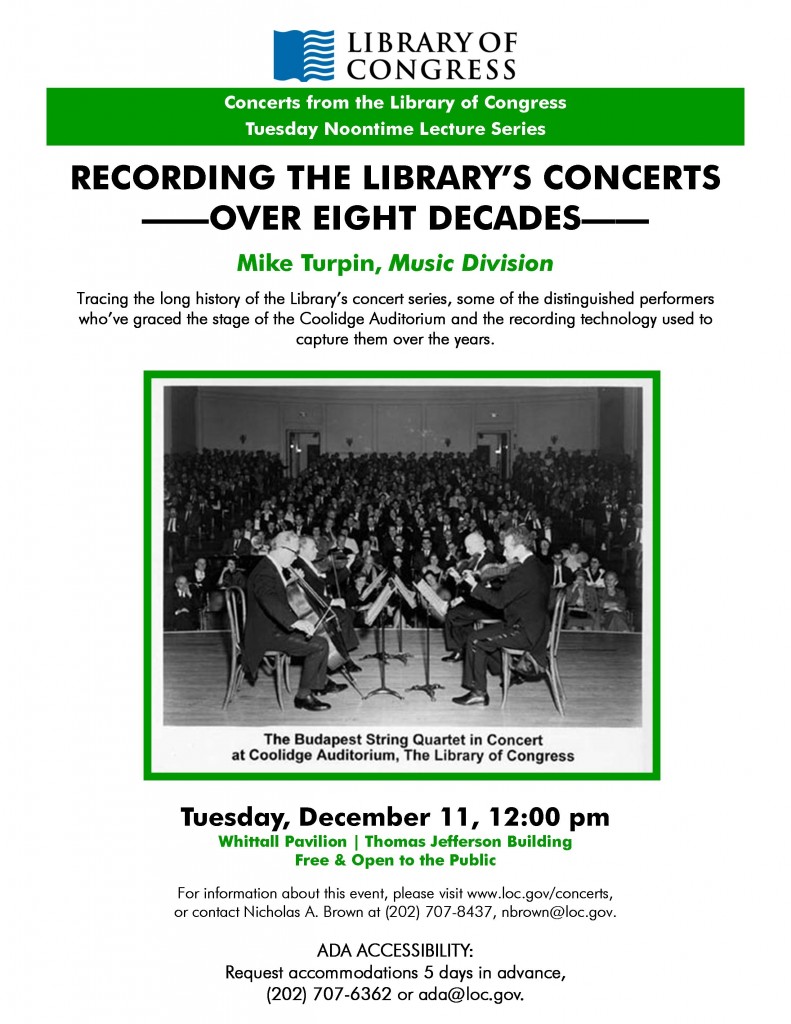While the Library of Congress is known for housing a treasure trove of materials ripe for the scholarly plucking, any library is only as good as the access it can provide to information. The accessibility of the collections—that less tangible but essential asset—is made possible by the Library’s employees, who possess a remarkable set of experiences and a vast knowledge of the collections that allow them to bring the holdings to life. On Tuesday, December 11th, as part of our noontime lecture series, we will have the pleasure of hearing Mike Turpin, our Audiovisual Production Specialist, speak about the history of recording at the Library. Mike has over thirty years of experience recording concerts in the Coolidge Auditorium and wherever else the Library needed him to be, making him one of the Library’s unique personnel assets. I asked Mike about how his career got started, and what he might speak about:
I’ve been interested in music and sound recordings my whole life. My late Aunt was a piano teacher and lived with us when I was growing up. She had very broad musical tastes and would go from practicing Bach and Mozart pieces to playing jazz recordings by Erroll Garner and Oscar Peterson. She loved Latin dance music and popular singers like Nat King Cole and Ella Fitzgerald. She also had a tape recorder which she used to record some of her recitals. I was fascinated by all of that music and equally fascinated with that tape recorder! I wanted to learn everything I could about how it worked.
I got my first job when I was in high school and spent all of my earnings on records and audio equipment. In college, I recorded the orchestra, the jazz band, the glee club and anyone else who gave me permission! This was at the University of Massachusetts, 1975-78. There were no music technology programs back then but I took every music course I could take without being a music major (I majored in communications which, in those days, consisted of film and broadcasting history). I also studied lots of physics and electronics and spent most of my free time in the A/V department.
I came to the Library in 1979 but didn’t start out as an engineer. I was one of six people hired to organize the recorded sound collections in the Landover warehouse. I got to know the engineers in the recording lab and when one of them announced he was leaving, that was my opening. That was in 1981 and since then, I’ve had the pleasure of recording this incredible concert series.
Oddly enough, I didn’t know about the concerts until I was a student at UMass and heard the live broadcasts which were carried on WFCR (Five College Radio) in Amherst. After graduation, I came back to DC (my home town) and worked for a short time at Campbell’s Music downtown. The WPAS box office was in the store and they sold tickets to the Library’s concerts. I attended a few of them and even brought a date once or twice. So it seems there were a couple of things that were leading me to this place!
When I decided to do this talk, I realized I was taking on a monumental task. Trying to cover 75 years of concerts in an hour seems kind of crazy and I expect it will lead to a second lecture or maybe a much larger project like an anthology (something I’ll do after I retire!). For this talk on Tuesday, I’ll just be scratching the surface but it will highlight some of the major artists who’ve played here: The Budapest Quartet, Leontyne Price and Samuel Barber (premiering the Hermit Songs in 1953), Leonard Bernstein with the Juilliard Quartet (1963), Itzhak Perlman with the Juilliard (1981…one of the first concerts I worked on) and others.
I will talk about the technology but don’t want to turn it into a boring lecture on the physics of sound waves, etc. Besides, my philosophy has always been that the technology is there to serve the music, not the other way around. As much as I love to learn about new equipment and advances on the technical side, I always come back to that question: how does it serve the music? At some point, I might do another talk and really focus on the technical stuff for all the audiophiles out there but this one will focus more on the history and the artists.
~Mike Turpin

